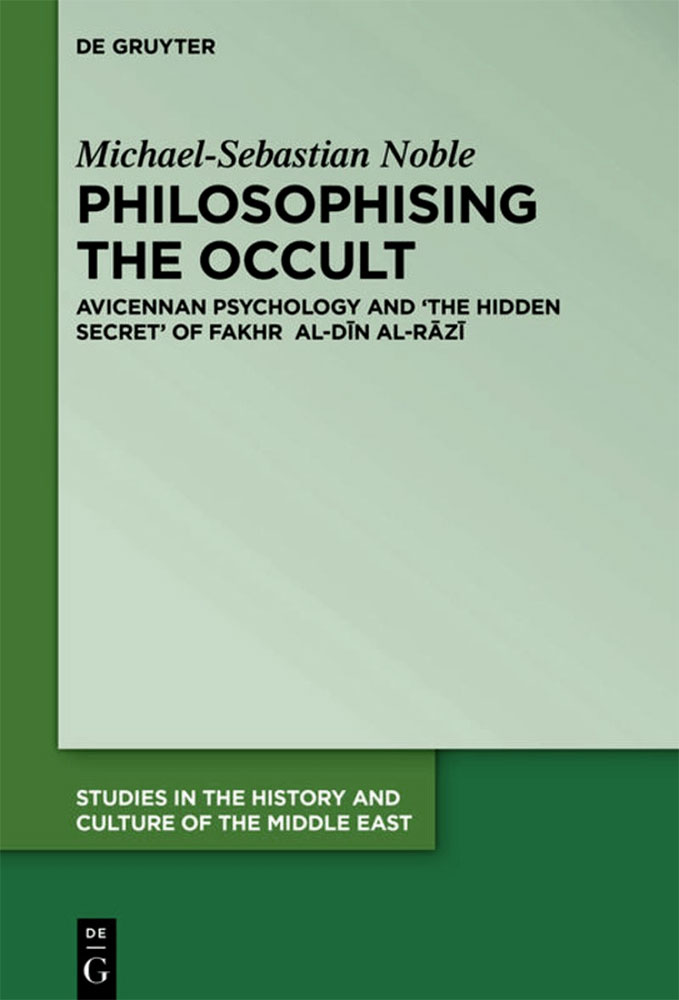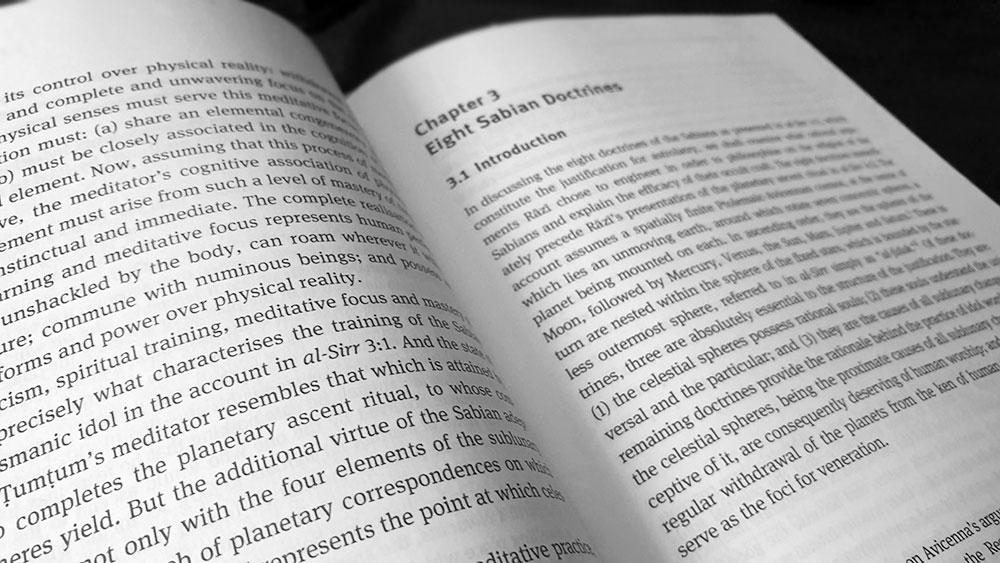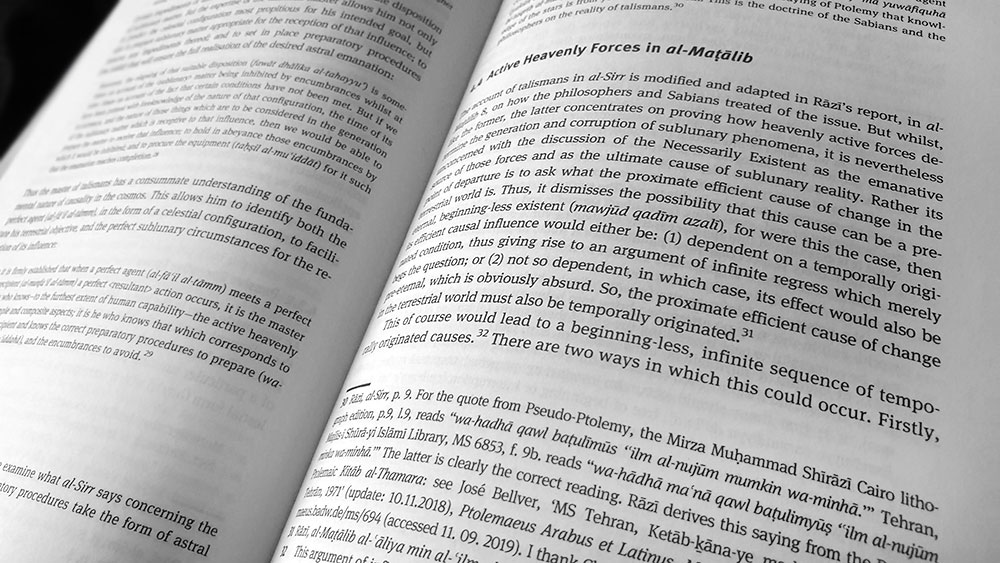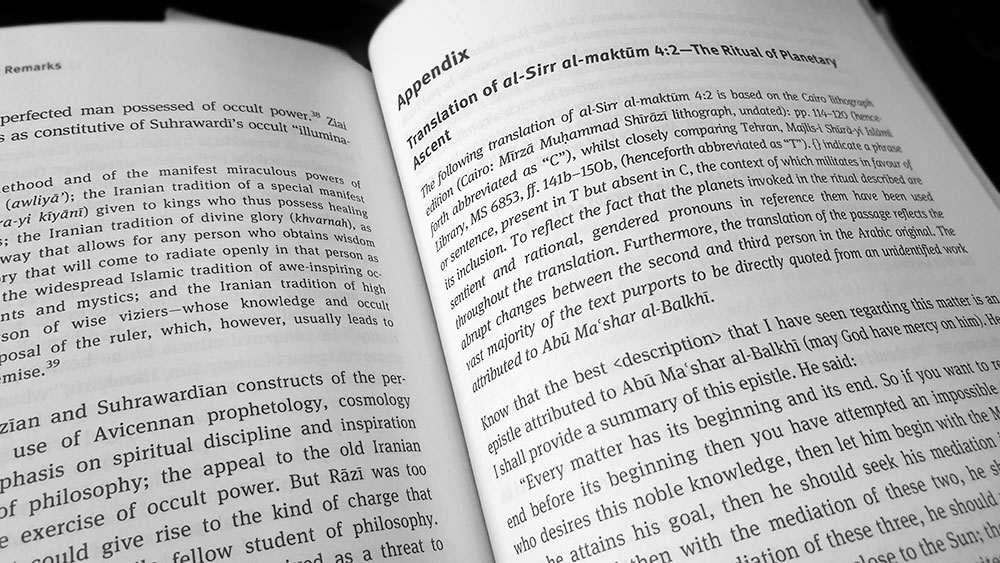 Presented as the 35th volume in De Gruyter’s series Studies in the History and Culture of the Middle East, Michael-Sebastian Noble’s Philosophising the Occult is a development of his 2017 doctoral thesis, pursued over four years at the University of London’s Warburg Institute. His focus here is on Fakhr al-Din al-Razi. Known as the Sultan of the Theologians, al-Razi was one of the most influential Islamic scholars of the twelfth century, writing various works on astronomy, chemistry, cosmology, history, jurisprudence, literature, medicine, ontology, philosophy, physics and theology. But he also covered matters considerably more magical and in one of his earliest works, Al-Sirr Al-Maktum Fiasrar Al-Nujcm (‘The Hidden Secret in the Secrets of the Stars’), he presented a study of the ‘craft’ of astral magic which drew upon spiritual discipline and natural philosophy to establish noetic connection with celestial souls in order to work wonders on earth. In this, the first ever full-length study of al-Sirr al-Maktum, Noble seeks to understand al-Razi’s intent in writing the work, and argues that it represents a synthesis of two sources: the perfect nature doctrine conceived by the twelfth century philosopher Abu’l-Barakat al-Baghdad?, and the naturalistic account of prophethood constructed by the eleventh century Persian polymath Ibn Sina (commonly known in the West as Avicenna).
Presented as the 35th volume in De Gruyter’s series Studies in the History and Culture of the Middle East, Michael-Sebastian Noble’s Philosophising the Occult is a development of his 2017 doctoral thesis, pursued over four years at the University of London’s Warburg Institute. His focus here is on Fakhr al-Din al-Razi. Known as the Sultan of the Theologians, al-Razi was one of the most influential Islamic scholars of the twelfth century, writing various works on astronomy, chemistry, cosmology, history, jurisprudence, literature, medicine, ontology, philosophy, physics and theology. But he also covered matters considerably more magical and in one of his earliest works, Al-Sirr Al-Maktum Fiasrar Al-Nujcm (‘The Hidden Secret in the Secrets of the Stars’), he presented a study of the ‘craft’ of astral magic which drew upon spiritual discipline and natural philosophy to establish noetic connection with celestial souls in order to work wonders on earth. In this, the first ever full-length study of al-Sirr al-Maktum, Noble seeks to understand al-Razi’s intent in writing the work, and argues that it represents a synthesis of two sources: the perfect nature doctrine conceived by the twelfth century philosopher Abu’l-Barakat al-Baghdad?, and the naturalistic account of prophethood constructed by the eleventh century Persian polymath Ibn Sina (commonly known in the West as Avicenna).
Avicenna believed that the human soul was composed of two parts: the rational soul (responsible for intellectual thought), and the animal soul (responsible for sensation and movement). Noble argues that al-Razi’’s theory of astral magic was based on his understanding of Avicenna’s concept of bifurcated souls, with the talismanic power of the celestial spheres being mediated by the human soul. Most notably, it was the rational soul that could be used to establish a noetic connection with the celestial spheres, and it was this connection that drew down their power into a talisman.
Noble frames his exploration within three primary themes: cognition, prophethood, and soteriology, and shows how these were developed and systemised in al-Razi’s work. While this may summarise the core argument of Philosophising the Occult, Noble is nothing if not thorough in his journey getting there, providing considered diversions into various relevant areas that establish vital context. As a result, this is a book whose value extends beyond the central premise, with much that is rewarding for those with a broad interested in Arabic mysticism and its intersection with pseudo-Aristotelian and Neoplatonic cosmologies.
Central to Al-Sirr Al-Maktum F?asrar Al-Nujcm is al-Razi’s representation of the Sabians, an enigmatic ‘people of the book’ mentioned three times in the Quaran whose identity has never been firmly established. Al-Razi was little concerned about the historicity of the Sabians, and used the term to broadly describe various forms of learned astrolatrous paganism, be it Egyptian, Indian, or that of any pre-Islamic Mesopotamian people, in particular the Chaldeans. As these types of non-Islamic sources could be condemned as heretical by pious Muslims, al-Razi took a hermeneutic approach, arguing that since God’s wisdom encompasses all things, no knowledge could be considered damnable, and nothing could be said to have been created in vain. Al-Razi’s conceptualisation of the Sabians was a syncretic one, drawing specifically on Hindu and Chaldean ideas, and then run through an Avicennan filter, with recourse in some instances to al-Baghdadi as well.
In his third chapter Noble analyses the eight Sabian doctrines, as understood by al-Razi, and gets to the meat of his hypothesis, breaking down al-Razi’s analysis of these cosmological concepts and seeking to show how he was influenced by arguments of Avicenna and Abu l-Barakat al-Baghdadi. No space is spared here, with each doctrine and its interpretations explained in sometimes excruciating detail, examining how al-Razi interpreted it, and how this aligned with the cosmovisions of Avicenna and Abu l-Barakat al-Baghdadi specifically, and with the worldview of Islam in general. It is the Sabian concept of the cosmos that facilitates the use of talismans, imagining a Neoplatonic scheme of emanations in which seven concentric celestial spheres encompassed the earth, each endowed with intelligences. These rational souls, it was argued, had perfect knowledge of the universal and were the causes of all sublunary change. As such, these intelligences could be petitioned through the sympathetic magic of talismans to affect change on earth. That’s the simplest explanation, but Nobel details all the justifications and science from al-Razi, Avicenna and Abu l-Barakat al-Baghdadi. And by science, we don’t really mean anything empirical or heuristic, just theoretical and often specious speculation and thought experiments, as was the style of the times. Ah, the wisdom of the ancients.
Noble’s fourth and fifth chapters turns to the talismans themselves, first explaining, as the chapter title puts it, the general physics or talismans, and then detailing their creation through a process called tamz?j (‘blending’), in which the active celestial influences were combined with receptive terrestrial forces. There endeth the consideration of talismanic magic, and in the remaining chapters, the discussion moves to matters augural and soteriological. Nobel concludes with an appendix, providing, as a valuable service, an English translation of the Ritual of Planetary Ascent (Al-Sirr al-maktum 4:2)
Philosophising the Occult runs to almost 300 total pages and is formatted in the standard De Gruyter house style of flat colour covers, headings both supra and sub in a bold sans serif and body text in the standard slightly slab-serif face that kinda scans as a sans-serif and feels, as a result, just a little unpropitious for reading. With the book’s overly-detailed accounting of all the Neoplatonic and Avicennan speculative theorising, it can be a little hard going in places, and it does feel like a reigning in of some of Nobel’s exhaustive treatment of his subject could have been beneficial. Nevertheless, Noble succeeds is showing that al-Sirr was not an aberrant minor composition in al-Razi’s oeuvre but rather an important text that embraced an original approach to matters philosophical and scientific in cosmology.
Published by De Gruyter



